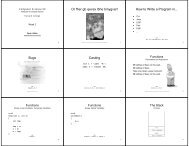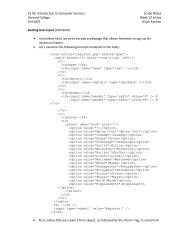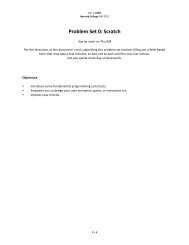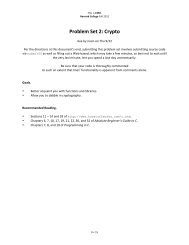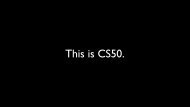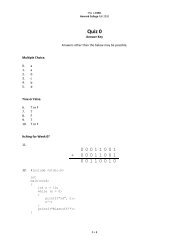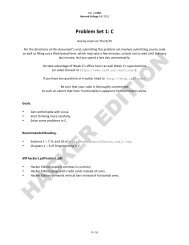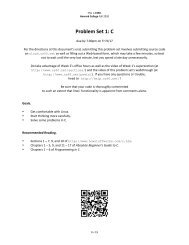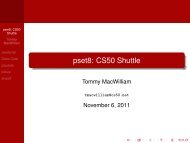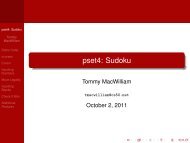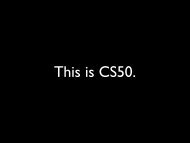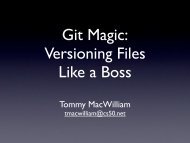Systems Programming and Machine Organization
Systems Programming and Machine Organization
Systems Programming and Machine Organization
Create successful ePaper yourself
Turn your PDF publications into a flip-book with our unique Google optimized e-Paper software.
A brief intro to<br />
CS61<br />
<strong>Systems</strong> <strong>Programming</strong><br />
<strong>and</strong> <strong>Machine</strong> <strong>Organization</strong><br />
Prof. Matt Welsh<br />
Harvard University<br />
November 16, 2009
CS61<br />
Fall 2010: Tuesday/Thursday 2:30-4:00<br />
Prerequisites: CS50 (or C programming experience)<br />
Can be used for CS concentration breadth requirement (“middle digit”)<br />
Can be used for CS secondary area requirement<br />
You can, <strong>and</strong> should, take both CS51 <strong>and</strong> CS61 at the same time!<br />
© 2009 Matt Welsh – Harvard University 2
What is CS61 all about?<br />
● Revealing the mystery of how machines really work!<br />
● Getting “under the hood” of programming at the machine level<br />
● Underst<strong>and</strong>ing what affects the performance of your programs:<br />
●<br />
●<br />
●<br />
Processor architecture<br />
Caching <strong>and</strong> memory management<br />
Processes, threads, <strong>and</strong> synchronization<br />
● Writing rock solid (<strong>and</strong> fast) systems code<br />
© 2009 Matt Welsh – Harvard University 3
Why CS61?<br />
● Huge gap between the concepts of programming <strong>and</strong> the reality<br />
● This gap is more profound when you start programming in higherlevel<br />
languages: Java, C++, Scheme, etc.<br />
● Need to underst<strong>and</strong> how machines really work to grasp:<br />
●<br />
●<br />
●<br />
●<br />
●<br />
Operating <strong>Systems</strong><br />
Databases<br />
Processor Architecture<br />
Compilers<br />
Networks<br />
● ... <strong>and</strong> even just to be a good programmer, even if you don't<br />
become a Computer Scientist.<br />
© 2009 Matt Welsh – Harvard University 4
Ken Thompson's Compiler Hack<br />
● Ken Thompson – Co-inventor of UNIX<br />
● Won Turing Award in 1983 (with Dennis Ritchie)<br />
● During his award lecture, made a stunning<br />
admission...<br />
© 2009 Matt Welsh – Harvard University 5
Thompson's Compiler Hack<br />
● Early days of UNIX: Thompson hacked the “login” program<br />
●<br />
Would accept a “magic” password to let him login on any UNIX system<br />
● Really helpful for debugging ...<br />
● Problem: The source code for “login.c” was widely distributed<br />
●<br />
●<br />
The whole system was “open source” (before we had that term...)<br />
So, anyone could find the backdoor code!<br />
● So, he hacked the C compiler...<br />
●<br />
●<br />
C compiler would recognize that it was compiling “login.c”<br />
Insert the backdoor code in at compile time<br />
© 2009 Matt Welsh – Harvard University 6
Thompson's Compiler Hack<br />
● Now the backdoor was in the compiler code.<br />
What if someone read that?<br />
● He hacked the compiler to recognize when it was compiling itself<br />
● The compiler was itself implemented in C.<br />
●<br />
(Chicken <strong>and</strong> egg problem: How did they write the first C compiler?)<br />
● The compiler would insert the backdoor code into itself!<br />
●<br />
So when the compiler compiles itself, it would insert the backdoor code to recognize<br />
when it was compiling login.c, to insert the backdoor code to check for the magic<br />
password. Got it?<br />
● He then deleted the original compiler source code.<br />
●<br />
The backdoor could only be found in the binary!<br />
© 2009 Matt Welsh – Harvard University 7
Why take CS61?<br />
● Learn how machines really work.<br />
●<br />
Use gdb <strong>and</strong> objdump like an expert.<br />
● Debug the hardest (<strong>and</strong> most interesting) bugs.<br />
●<br />
Stuff that only makes sense when you can read assembly.<br />
● Hacking binaries for fun <strong>and</strong> profit.<br />
●<br />
How did the iPhone get jailbroken? The Code Red virus spread so quickly?<br />
● Measure <strong>and</strong> improve the performance of your programs.<br />
●<br />
Underst<strong>and</strong> memory hierarchies, processor pipelines, <strong>and</strong> parallelism.<br />
● Write concurrent, multi-threaded programs like a pro.<br />
●<br />
The basis for every application <strong>and</strong> server on the Internet today.<br />
© 2009 Matt Welsh – Harvard University 8
Er, this sounds really hard...<br />
● CS61 is not intended to be a heavy workload course.<br />
●<br />
●<br />
Challenging, but fun.<br />
Intended for everyone who has taken CS50 – not just CS concentrators<br />
● Five lab assignments – can work in pairs:<br />
●<br />
●<br />
●<br />
●<br />
●<br />
1) Defusing a binary bomb<br />
2) Hacking a buffer overrun bug<br />
3) Implementing dynamic memory allocation<br />
4) Writing your own UNIX shell<br />
5) Building a concurrent Internet service.<br />
● One midterm, <strong>and</strong> a final. That's it.<br />
© 2009 Matt Welsh – Harvard University 9
Topics to be covered<br />
● Intel x86 assembly language programming<br />
●<br />
Registers, memory, control flow, procedures, data structures<br />
● Performance measurement <strong>and</strong> program optimization<br />
● Linking <strong>and</strong> loading<br />
● Memory hierarchy, caching, <strong>and</strong> dynamic memory allocation<br />
● UNIX systems programming: files, pipes, signals, processes<br />
● Threads <strong>and</strong> synchronization<br />
● UNIX sockets programming<br />
● Implementing concurrent servers<br />
© 2009 Matt Welsh – Harvard University 10
© 2009 Matt Welsh – Harvard University 11
CS61<br />
CS51<br />
Or take both!<br />
© 2009 Matt Welsh – Harvard University 12
Questions?<br />
● Email me! mdw@eecs.harvard.edu<br />
● Or drop by Maxwell Dworkin 233<br />
© 2009 Matt Welsh – Harvard University 13



